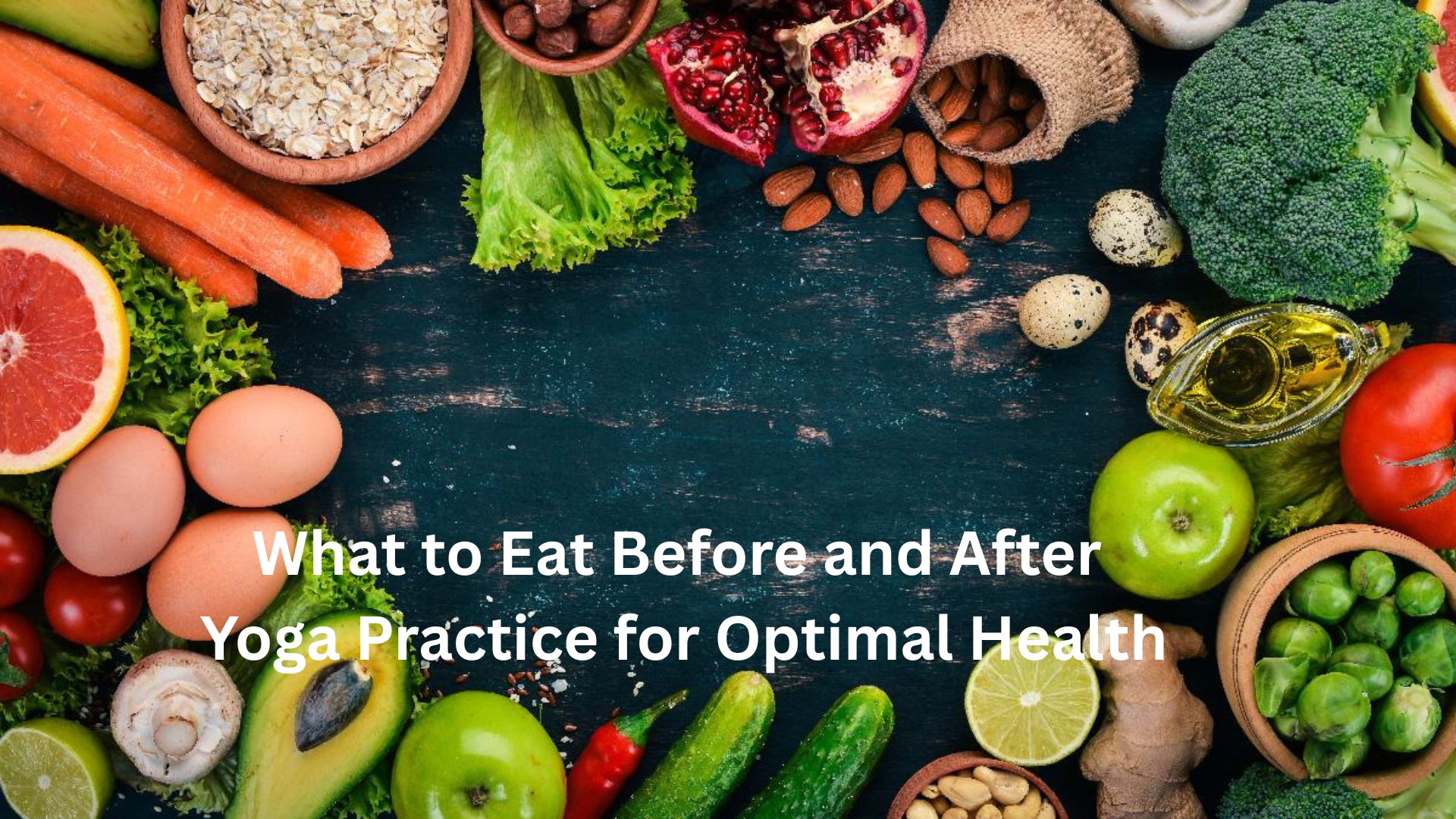No matter how far along you are in your yogi ways or new on the mat, one thing is certain, and what you eat can have a tremendous impact on your practice. Think how good it feels to fall in to that ideal downward dog or moving through sun salutation routine and feeling charged up and still. But did you know that your performance before and after your yoga session not only can be improved by the right fuel but also your overall health? This blog post is going to touch on scrumptious snacking ideas and explosive meals that will help maximize your energy levels, get you healed and take care of your body in balance. It is time to find out how mindful eating can take your yoga practice and wellness change to the next level!
Introduction: Why nutrition is important for yoga practice
Yoga is not an exercise, but it is something more than a way of living. Paying attention to nutrition is vital in case you want to make the most out of yoga. Proper nutrition will maximize your energy, make you flexible and recover faster. Once you are in the groove of sun salutations or maintaining the balance and strength in your favorite poses, what you eat both before and after class is instrumental in the feel you get out of your body.
Think of revving up on your mat with lively energy -arm and leg muscles all limbered up and strong- and walking off feeling revived. This change begins way before you are in the studio. When you take care of your body in the right way you are not only getting the best results in doing yoga but also you are improving your health.
So, what are the most optimal nutritional plans that will raise not only your mat experience but also your overall off-the-mat health?
Understanding the different elements of a balanced diet
Nourishing food has many different components that come together and make a whole that sustains your body. All the components are important in retaining health and improving performance particularly with regards to yoga practice.
Energy is essential to carbohydrates. They offer the speedy fuel requirement of the hard hitting on the mat. Consider grains, fruits and vegetables; these will give long lasting stamina without burdening you.
The muscles recover and grow with the help of proteins. Lean meats or legumes or dairy can also aid in tissue repair following a tough class.
One should not ignore the healthy fats too. Other foods such as avocados and nuts contain fatty acids required in the functioning of the brain and general well-being.
Plants that are colorful contain vitamins and minerals that assist in immune response and energy generation. Aim at variety so that you are taking all different kinds of nutrients.
Lastly, do not go without water, it is an important key to physical body maximal functioning through the practice.
Pre-yoga meal planning: What to eat and when to eat it
To be able to optimise energy and concentration, meal planning needs to be involved before your yoga exercise. Your body needs the right foods to increase the work capacity on the mat.
Go into class with an aim of eating a light snack or meal 30 minutes to one hour before. This helps that the digestion process is well activated and does not feel heavy holding the poses.
Attention should be paid to readily-absorbed carbohydrates, for easy energy. Consider this in terms of bananas, oats or a piece of whole-grain bread with nut butter. The alternatives offer a prolonged energy source without book.
In case of more time, then a balanced meal two hours prior yoga can be taken. Add lean protein such as yogurt or eggs, along with healthy fats in the form of avocadoes or nuts, to have long-term results.
Heavy meals near practice time should be avoided because they result in lethargy or cramps. Keep an eye to what your body needs and vary the timing according to the personal responses in various sessions.
Post-yoga recovery: The importance of replenishing your body after a workout
Post yoga body deserves to be taken care of. The best health and performance is achieved by putting an emphasis on recovery.
In yoga you work with muscles and energy. This produces minute tears in muscle fibers which have to be mended. Through proper supplementation with the proper nutrients, this recovery can be assisted.
After exercising in yoga, protein is critical. It helps in repairing and growth of muscles. Include sources of protein, such as Greek yogurt or protein smoothie in your diet.
Carbohydrates also contribute largely in recovery of lost glycogen levels during practice. Whole-grain toast or a piece of fruit will also give you the energy to sustain you in your next session.
And hydration should not be ignored either. Once you have perspired out on the mat, water also facilitates in the release of toxins and loss of body fluids. Include electrolytes in the mix to help balance out too.
Tuning into your body post-yoga will help you know what it really wants as a way of recovering.
More Details: 300 Hour Yoga TTC in Rishikesh
Nutritious snacks and meals for before and after yoga
Prior to yoga, light and easily digestible foods and snacks should be picked. A banana is very awesome. Its natural sugars give instant energy and do not make you too heavy.
Honey and berries can give protein and antioxidants to your Greek yogurt practice. A handful of nuts or seeds is another excellent option, as it provides healthy fats, which satiate hunger and at the same time promote focus.
When you are at your session, consider focusing on recovery foods that can be used to replace lost nutrients. Spinach, avocado and almond milk smoothie will provide vitamins and minerals needed to fix the muscles.
Vegetable rich quinoa salad is also a good post yoga food. It contains high protein and fiber content, which makes it ideal to replenish energy after a hard exercise.
Do not overlook hydrating! Coconut water is a refreshing source of electrolytes to replenish lost electrolytes to your body during practice and keep you energized throughout the day.
Hydration tips for optimal performance
Spread water intake to increase your yoga practice. The benefits of water include: It helps the body regulate the body temperature; it lubrication of joints and also carries nutrients.
In the attempt of drinking some water before hitting the mat. An ounce or two about 30 minutes before can give you energy and concentrate. This pre hydrating establishes a good foundation to your session.
As a part of the lesson, it may be a good idea to take small sips should you feel like you need them. One can easily lose track of hydrating in a hectic flow or meditation case, however, even a couple of drops can lead to a change.
Once yoga has been done, hydrate better with additional water or electrolyte beverages of natural origin such as coconut water. These alternatives are beneficial to regain the equilibrium without commercial sports drinks and added sugars.
We should listen to our bodies, thirst is not the only sign of hydration requirements. Maintain a check of how you feel, during your practice; where necessary rehydrate to maintain performance and wellbeing.
Mindful eating: Incorporating mindfulness into your pre and post-yoga meals
The process of mindful eating changes how you relate to food, particularly, when you practice yoga. Carry that love of the bite to your mat before you step to it. Pay attention to colors, textures and tastes of your meal. Such awareness is not only capable of improving digestion, but also improving attentiveness during your session.
There is still another mindfulness occasion, namely post yoga meals. A complete deep stretch followed by some deep breathing, and then keep every bite nourishment towards healing your body. Slower chewing enables you to become attuned to the feelings of how you feel eating, active or drowsy.
Use of tranquil eating environment is also important. Avoid screen time or music that may be too loud; rather, make an environment that will force introspection concerning what you are consuming.
This practice assists one to be appreciative of what nourishes the body and the soul and improve the well-being through your yoga practice.
Must Read: 200 Hour Yoga Teacher Training in Rishikesh
The role of supplements in supporting your yoga practice
With supplements, your yoga can be complementary and supplemental so that overall health and wellness is improved. As much as you should stick to whole foods, supplements can be used with the aim of correcting nutrition gaps.
As an example, magnesium plays an essential role in relaxation and recovery of muscles. It has proven to help in eliminating cramps and tension to many yogis. The omega 3 fatty acids improve the health of joints and limit inflammation, which is desirable after the intense sessions.
An alternative is the use of probiotics. They improve bowel health that is crucial in nutrient assimilation. Better happiness of the gut leads to improvement in energy levels in the course of practice.
Do not ignore such adaptogens as ashwagandha or rhodiola. These herbs promote stress management and stamina to enable you to explore all your movements on the mat.
Like any supplement program, it is best to consult a medical professional prior to beginning new products to make sure that their use agrees with your unique balance.
Conclusion: Nourish your body, nourish your yoga practice
Feed your body as the first essential element in the improvement of your yoga. The appropriate diet is not only able to supply your physical actions but the mind and emotional stability. Every meal that you eat before and after yoga is purposeful as it will give you energy to complete those sun salutations or help you as you recover.
Choose to live by the strength of complete foods, balanced diets and mindful eating. Focus on what feels good to you- you can test, and feel the difference before you fall into a groove that sounds right to you both in your body and in your mind.
Water is equally crucial in the effort to ensure high performance on the mat. Have water on hand and you may want to add electrolyte beverages should you be sweating heavily during the sessions.
Finally, although food forms the basis of nourishment, supplements may provide extra help according to an individual requirement. When you think of them, make sure to talk to a healthcare professional about them so that you can choose cruciferous vegetables that fit into your overall wellness picture.
Once you make mindful eating a top priority about yoga, you will develop an excellent background to attaining excellent health not only on the yoga mat but in every facet of the life.


